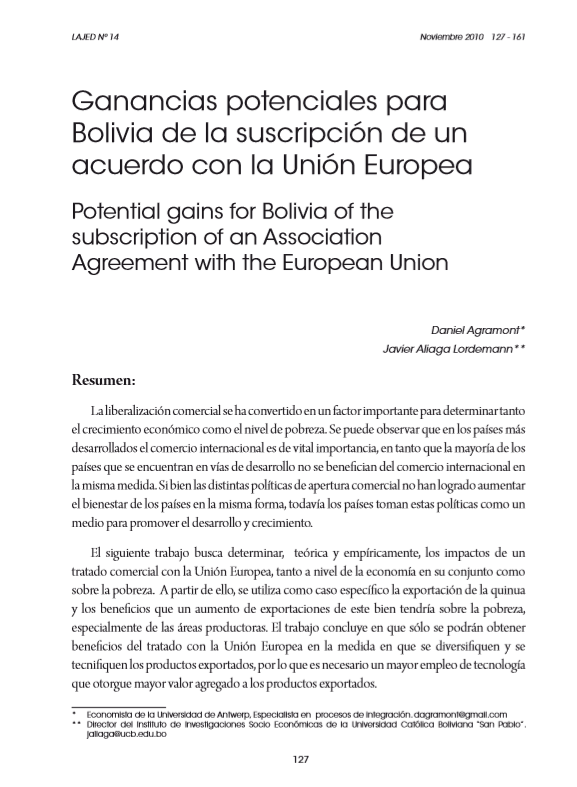Potential gains for Bolivia of the subscription of an Association Agreement with the European Union
DOI:
https://doi.org/10.35319/lajed.201014359Keywords:
Economic Growth, Poverty, Export, Bolivia, European Union, Quinua, Added Value, diversification, TechnologyAbstract
The liberalization trading has become a really important factor to determine both, the economic growth and the level of poverty in a country. It can be observed that in developed countries, international trading is essential, while in most of the developing countries do not get the same benefits. Although commercial openness could not raise the economic welfare in the same proportion in all of the countries where it was applied, it is still a model used in order to achieve development. The following paper looks for determining, theorically and empirically, the impacts of an Association Agreement with the European Union over the economy in general and the poverty levels. Then, a specific case is used, when talking about the impacts on the exports of quinoa and the benefits that the raise in the exports of this product can bring to the rural communities that produce it. The paper concludes that the only way to get the benefits of the Association Agreement with the European Union is to diversify the products that Bolivia exports and use more modern technology that can give the products a higher aggregate value.
Downloads
References
Baghwati, J. 2004. In defence of globalization. New York: Oxford University Press
--------------- 1991. The World Trading System at Risk. Princeton University Press
-------------- 2008. “Termites in the Trading system: how preferential trade agreements undermine free trade”. New York: Oxford University Press
Bird, K . Nguyen, N. 2007. “Pro-poorness of trade policies: a review of international experience”. London: Overseas Development Institute
Buxton, N. 2007. “Bolivia intent on commercial suicide?” www.tni.org
Calfat, G. and R . Flores. 2006. “The EU-Mercosol Free Trade Agreement: quantifying mutual gains”
Cline, W et al. 1978. “The negotiations in the Tokyo Round: a quantitative assessment”. Washington DC: The Bookings Institution.
Corporación Andina de Fomento. 2008. “Caracterización y análisis de competitividad de la quinua en Bolivia”. Proyecto Andino de Competitividad, Corporación Andina de Fomento.
David, D. et al. 1999. “Trade, income disparity and poverty”. Special Study #5. World Trade Organization
FAO. 2002. “La mujer en la agricultura, medio ambiente y la producción rural en Bolivia”
Hadjiyiannis, C. 2004. “Common Markets and Trade Liberalization”, Canadian Journal of Economics.
Hoekman, B. et al. 2002. “Development, trade and the W TO: a handbook”. The World Bank, Washington D.C
Janko, M. 2000. “Importancia del sector agrícola en Bolivia”, Asociación Latinoamericana de Libre Comercio, Montevideo
Krugman, P. 1989, “Is bilateralism bad?”, NBER Working paper # 2972
----------------. 1991. “The move toward free trade zones”, Federal Reserve Bank of Kansas.
-----------------“La calidad de la quinua boliviana es su mejor carta de presentación”, www.bolivia.com
Laird, S. and A. Yeats. 1990. Quantitative methods for trade-barrier analysis, London: McMillan Pres
Mariño, Jorge. 1999. La supranacionalidad en los procesos de integración regional. Madrid: Mave Editores.
McCulloc, N. et al. 2001. Trade liberalization and poverty: a handbook, London: UK Department for International Development.
Mercado, A. 2004. “Exportaciones y crecimiento económico”, IISEC, La Paz
Ministerio de la Presidencia. 2006. “Plan Nacional de Desarrollo”, República de Bolivia
Negri, A. and G. Cocco. 2006. “Global, biopoder y luchas en una America Latina globalizada”. Buenos Aires: Editorial Paidós
Olarreaga, M. and B. Giussani. 2006. “Trade, integration and policies”. In: Bolivia: public policy options for the well-being of all. The World Bank. Washington
Schiff, M. and A. Winters. 2003. “Regional integration and development”. Washington D.C.: Oxford University Press.
Soto, J. 2006. “Innovación en el cultivo de la quinua”. International Food Policy Research
InstituteTe Velde, W. et al. 2006. Regional integration and poverty. London: Ashgate Publishing
Winters, A. 2000. “Trade liberalization and poverty”. UK Department of International Development, London.






